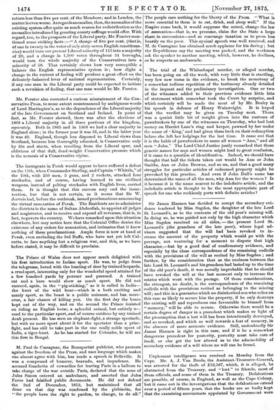Sir James Hannen has decided to accept the secondary evi-
dence tendered by Miss Sugden, the daughter of the late Lord. St. Leonard's, as to the contents of the old peer's missing will. In doing so, he was guided not only by the high character which Miss Sugden received on all sides, — the present Lord St._ Leonard's (the grandson of the late peer), whose legal ad- visers suggested that the will had been revoked to in- crease the amount of the property which would go with the peerage, not venturing for a moment to dispute that high character,—but by a good deal of confirmatory evidence, and especially by the close correspondence of the remaining codicils with the provisions of the will as recited by Miss Sugden ; and further, by the consideration that as the coolness between the late Lord St. Leonard's and his grandson had lasted up to the time of the old peer's death, it was morally improbable that he should have revoked the will at the last moment only to increase the estates which went with the peerage. Of these considerations, the strongest, no doubt, is the correspondence of the remaining codicils with the provisions recited as belonging to the missing will; and this is a guarantee which no disinherited son who relies on this case as likely to secure him the property, if he only destroys the existing will and reproduces one favourable to himself from "memory," will be able to secure. Otherwise there would be a certain degree of danger in a precedent which makes so light of the presumption that a lost will has been intentionally destroyed, and so revoked, and which so well rewards a feat of memory, in the absence of more accurate evidence. Still, undoubtedly Sir James Hannen is right in this case, and if it be a somewhat dangerous precedent for posterity, posterity must take care of itself, or else get the law altered as to the admissibility of secondary evidence of a will where no will can be found.


































 Previous page
Previous page